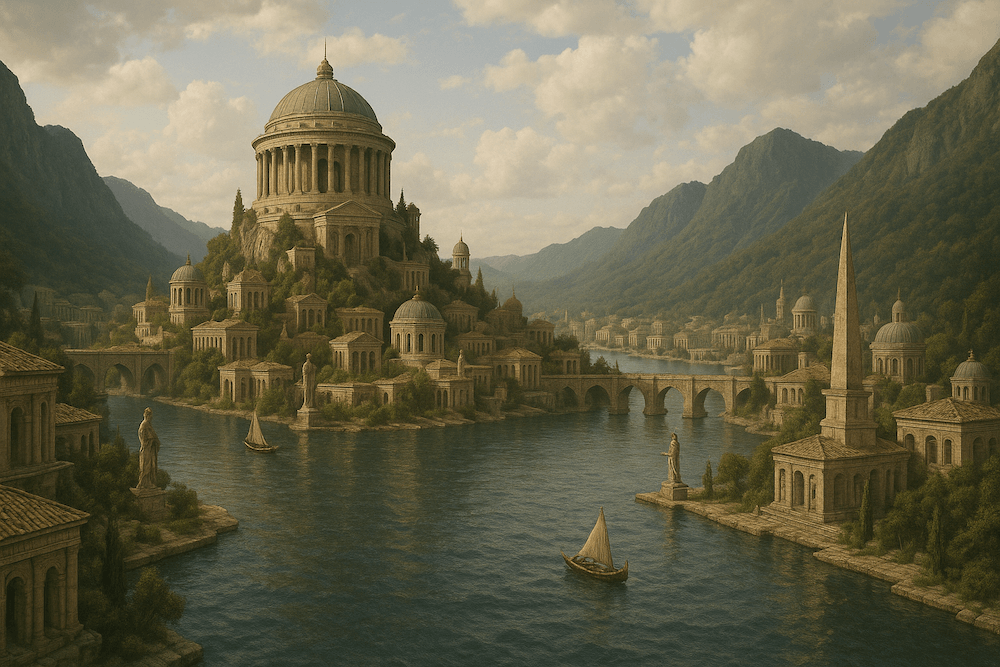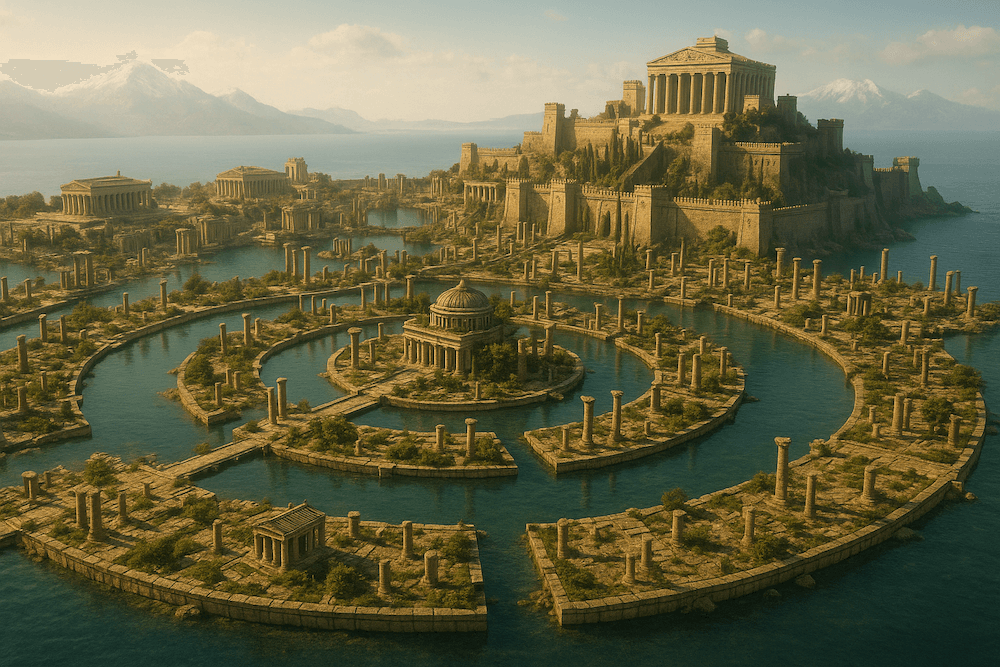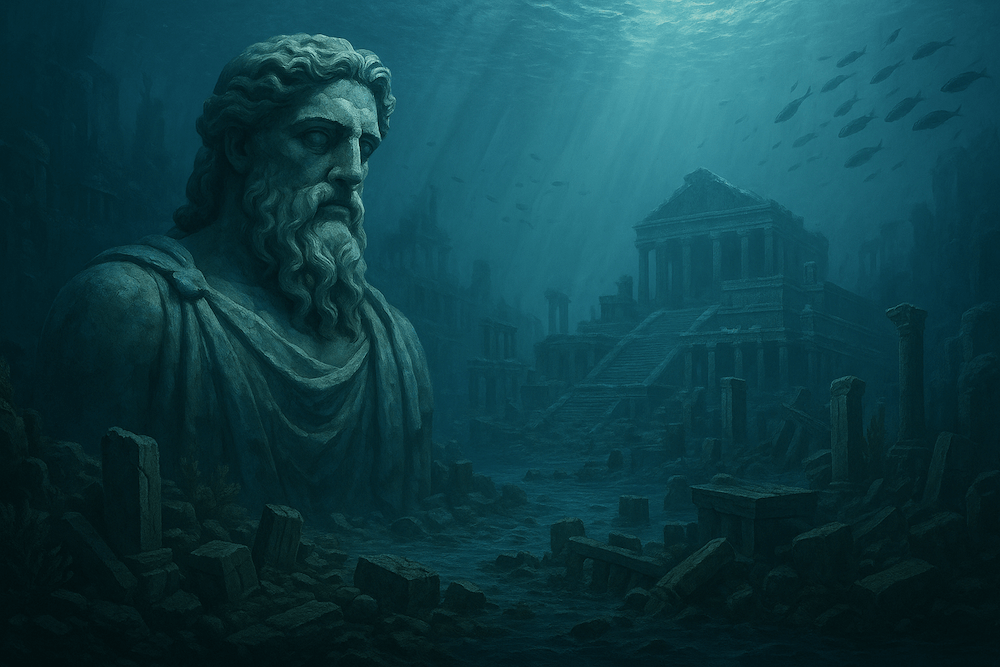The story of Atlantis has fascinated people for more than 2,000 years. It may be the most enduring mystery at the crossroads of mythology, archaeology, and philosophy. Plato, a Greek philosopher, first wrote about Atlantis in his dialogues Timaeus and Critias around 360 BCE. He said it was a powerful island civilization that "disappeared in a single day and night of misfortune." What started as a philosophical allegory has turned into one of history's longest-lasting searches for a lost civilization.
The Platonic Base
Plato's narrative is the only primary source for Atlantis. He said that Egyptian priests told the story to the Athenian lawmaker Solon, who then told it to Plato's family. The philosopher said that Atlantis existed 9,000 years before his time (around 9600 BCE) and was "beyond the Pillars of Hercules" (now the Strait of Gibraltar). He also said it was "larger than Libya and Asia together."
The presence of Atlantis in philosophical discourse indicates that it was probably not meant to be taken as historical truth. Plato set the story in the distant past because "our ignorance of ancient history lets us believe that the story could happen." In Plato's philosophy, the story had many uses: it looked at the perfect state, the corrupting nature of power, and the rise and fall of civilizations.

"All your warlike men in one body sank into the earth in a single day and night of misfortune, and the island of Atlantis similarly vanished in the sea's depths."
— Timaeus, Plato
Aristotle (384–322 BCE), Plato's most famous student, said that the story of Atlantis was made up and that Plato "made Atlantis disappear" as he wrote it. This early skepticism from someone who knows Plato's methods well gives us important information about what the story is meant to be.
The Current Archaeological Consensus
Modern archaeologists generally concur that Atlantis represents a 'utopia,' a perspective similarly held by classical philologists, who view Atlantis as a metaphorical rather than a literal location. This scholarly consensus is the result of decades of careful study of Plato's work in its proper philosophical and historical setting.
Recent surveys show that there is a worrying gap between what scholars know and what the general public believes. In 2020, 57% of Americans believed in ancient aliens and 41% believed in Atlantis. This is up from 27% and 40%, respectively, in 2016. Professional archaeologists are worried about the growing belief in pseudoarchaeological theories because they stress the importance of research based on evidence.
The Minoan Link: Santorini and the Eruption of Thera
The most scientifically plausible theory connecting Atlantis to historical occurrences pertains to the calamitous eruption of Thera (present-day Santorini) and the deterioration of Minoan civilization. The Minoan eruption, which happened around 1600 BCE, was one of the biggest volcanic events in history. It had a Volcanic Explosivity Index (VEI) of 7 and sent out about 28–41 km³ of material.
Archaeological digs at Akrotiri, which started in earnest in 1967, uncovered a Bronze Age Pompeii with houses that had two or three stories and rooms filled with beautiful frescoes and painted ceramics. This complex settlement, which was buried under volcanic ash, shows how advanced Minoan civilization was.
The eruption had effects that went far beyond Santorini itself. Archaeological evidence on Crete shows that powerful tsunamis caused by the volcanic eruption left behind chaotic layers of soil, broken pottery, building materials, and cattle bones along the coast near Palaikastro. Carbon dating of organic material in these tsunami deposits shows that they were put down around 1600 BCE, which is the same time as the Thera eruption.
Spyridon Marinatos, who found the Akrotiri site, thought that the Minoan eruption is shown in Plato's story of Atlantis. However, this idea is not supported by current research, even though it is common in popular culture. The chronological inconsistency persists as a significant impediment; the Minoan civilization thrived in the second millennium BCE, contrary to the tenth millennium indicated by Plato's timeline.

The Controversy Over the Date
Plato's timeline makes it hard to connect any real event to Atlantis. Evidence from dendrochronology and radiocarbon dating points to the Thera eruption happening around 1628 BCE. Evidence from Egyptology points to the decline of Crete as a major power happening during the 18th dynasty, sometime after 1450 BCE.
Recent radiocarbon studies conducted between 2021 and 2023 indicate a timeframe within the sixteenth century BCE, with the most recent studies suggesting a range of 1610-1510 BCE or 1602-1502 BCE. Even if we accept these dates, there is still a huge gap between any likely Bronze Age event and Plato's Mesolithic timeline of 9600 BCE.
The Truth About Archaeology vs. What People Think
Since Donnelly made hunting for Atlantis popular in the 19th century, many places have been suggested. The name has become a generic term that is no longer connected to Plato's story. A lot of the proposed sites aren't even in the Atlantic Ocean, and few of them today are based on scholarly or archaeological evidence. Some of them were even made up by psychics or other pseudoscientific means.
Recent assertions, including archaeologist Michael Donnellan's claim of locating Atlantis near Spain's coast, persist in emerging. But mainstream archaeological institutions are still very skeptical of these kinds of claims, which often don't have peer review or independent verification.
Even though there have been many theories, trips, and searches over the years, no solid proof or clear archaeological remains of Atlantis have been found. Many claims don't have strong empirical evidence and depend on guesses about historical texts or unclear geological formations.
The Bigger Picture: Lost Civilizations and Cultural Memory
The search for Atlantis has led to real archaeological finds that weren't meant to happen. The discovery of Pavlopetri in 1967, the oldest submerged city ever found off the coast of Greece, showed that advanced ancient cities could really disappear beneath the waves. These kinds of discoveries support the idea that coastal settlements have been lost because of changes in sea level and geological events.

Recent studies indicate that if Atlantis were situated in a real location, it would have to consider that the oceans and the Mediterranean were 400 feet lower during the suggested period, implying that any evidence would currently be submerged. Because of this geological fact, some researchers are now focusing their searches on continental shelves that are now underwater and places that used to be above sea level.
The Psychological and Cultural Aspect
Atlantis is a place where myth and reality mix, making us wonder not only what happened a long time ago, but also why we still dream about it today. The story touches on universal human themes, like the rise and fall of great civilizations, the effects of pride, and how fragile human success is.
The legend reflects human hopes and fears, showing both the best and worst of what people can do and the pride that leads to ruin. This psychological aspect elucidates the enduring allure of Atlantis, irrespective of its historical accuracy.
Real Science vs. Pseudoarchaeology
Professional archaeologists are becoming more aware of how important it is to actively fight against false claims about Atlantis and other similar stories. These ideas may seem harmless, but they often come from the idea that ancient non-European societies weren't capable of making complex things, which is racist at their core.
Because more people believe in ancient aliens and Atlantis, archaeologists have started to work more closely with the public. They explain their methods step by step to counter claims that researchers are hiding evidence. This is a big change from the way academics used to avoid talking to the public about fringe theories.
Current Research and Prospective Trajectories
New archaeological techniques keep showing how complicated ancient civilizations were. Recent studies employing advanced drilling techniques have uncovered evidence of volcanic eruptions significantly larger than the Minoan eruption; one submarine explosion occurring 520,000 years ago is estimated to be 30 times greater than the event that devastated the Minoans.
These discoveries remind us that terrible geological events have happened many times in the past, which gives more weight to the idea that disaster stories like Atlantis may have been based on real events.
Conclusion: Myth, Memory, and Meaning
The inquiry into the existence of Atlantis ultimately surpasses mere historical validation. Current interdisciplinary research situates Atlantis within a comprehensive context of historical geography and mythology, investigating its links to tangible locations such as the Iberian Peninsula, North African cultures, and Atlantic islands.
It doesn't matter if Plato made up Atlantis or got the idea from mixed-up memories of real disasters; the story has a purpose beyond being accurate. It symbolizes humanity's shared memory of loss, our intrigue with the unknown, and our persistent aspiration that evidence of remarkable ancient accomplishments lies in wait for discovery.
The scientific consensus is that the place Plato described as Atlantis probably never existed. But the legend's strength is not in how true it is to history, but in how it makes people want to learn more about the past. The search for lost civilizations goes on as we make new technologies for underwater exploration and archaeological research. We're not looking for Atlantis itself, but for the real stories of human achievement and disaster that may have inspired such long-lasting myths.
In this way, Atlantis shows both the risks of not being scientific and the benefits of staying curious about our past. The problem for modern archaeology is how to keep people interested in lost civilizations while still following evidence-based research methods. The mystery of Atlantis will keep changing as long as people make up stories about it and try to figure out where they came from. It will be a link between the known and unknown parts of human history.
